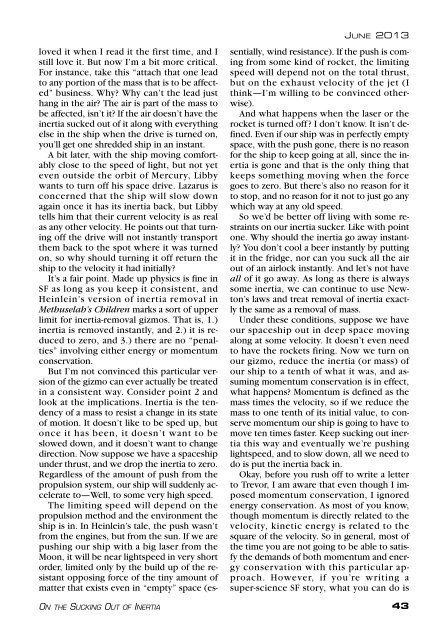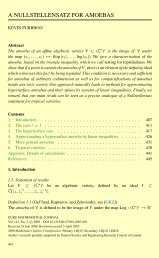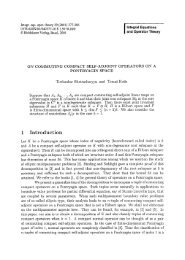Analog Science Fiction and Fact - June 2013
Analog Science Fiction and Fact - June 2013
Analog Science Fiction and Fact - June 2013
Create successful ePaper yourself
Turn your PDF publications into a flip-book with our unique Google optimized e-Paper software.
loved it when I read it the first time, <strong>and</strong> I<br />
still love it. But now I’m a bit more critical.<br />
For instance, take this “attach that one lead<br />
to any portion of the mass that is to be affected”<br />
business. Why? Why can’t the lead just<br />
hang in the air? The air is part of the mass to<br />
be affected, isn’t it? If the air doesn’t have the<br />
inertia sucked out of it along with everything<br />
else in the ship when the drive is turned on,<br />
you’ll get one shredded ship in an instant.<br />
A bit later, with the ship moving comfortably<br />
close to the speed of light, but not yet<br />
even outside the orbit of Mercury, Libby<br />
wants to turn off his space drive. Lazarus is<br />
concerned that the ship will slow down<br />
again once it has its inertia back, but Libby<br />
tells him that their current velocity is as real<br />
as any other velocity. He points out that turning<br />
off the drive will not instantly transport<br />
them back to the spot where it was turned<br />
on, so why should turning it off return the<br />
ship to the velocity it had initially?<br />
It’s a fair point. Made up physics is fine in<br />
SF as long as you keep it consistent, <strong>and</strong><br />
Heinlein’s version of inertia removal in<br />
Methuselah’s Children marks a sort of upper<br />
limit for inertia-removal gizmos. That is, 1.)<br />
inertia is removed instantly, <strong>and</strong> 2.) it is reduced<br />
to zero, <strong>and</strong> 3.) there are no “penalties”<br />
involving either energy or momentum<br />
conservation.<br />
But I’m not convinced this particular version<br />
of the gizmo can ever actually be treated<br />
in a consistent way. Consider point 2 <strong>and</strong><br />
look at the implications. Inertia is the tendency<br />
of a mass to resist a change in its state<br />
of motion. It doesn’t like to be sped up, but<br />
once it has been, it doesn’t want to be<br />
slowed down, <strong>and</strong> it doesn’t want to change<br />
direction. Now suppose we have a spaceship<br />
under thrust, <strong>and</strong> we drop the inertia to zero.<br />
Regardless of the amount of push from the<br />
propulsion system, our ship will suddenly accelerate<br />
to—Well, to some very high speed.<br />
The limiting speed will depend on the<br />
propulsion method <strong>and</strong> the environment the<br />
ship is in. In Heinlein’s tale, the push wasn’t<br />
from the engines, but from the sun. If we are<br />
pushing our ship with a big laser from the<br />
Moon, it will be near lightspeed in very short<br />
order, limited only by the build up of the resistant<br />
opposing force of the tiny amount of<br />
matter that exists even in “empty” space (es-<br />
ON THE SUCKING OUT OF INERTIA<br />
JUNE <strong>2013</strong><br />
sentially, wind resistance). If the push is coming<br />
from some kind of rocket, the limiting<br />
speed will depend not on the total thrust,<br />
but on the exhaust velocity of the jet (I<br />
think—I’m willing to be convinced otherwise).<br />
And what happens when the laser or the<br />
rocket is turned off ? I don’t know. It isn’t defined.<br />
Even if our ship was in perfectly empty<br />
space, with the push gone, there is no reason<br />
for the ship to keep going at all, since the inertia<br />
is gone <strong>and</strong> that is the only thing that<br />
keeps something moving when the force<br />
goes to zero. But there’s also no reason for it<br />
to stop, <strong>and</strong> no reason for it not to just go any<br />
which way at any old speed.<br />
So we’d be better off living with some restraints<br />
on our inertia sucker. Like with point<br />
one. Why should the inertia go away instantly?<br />
You don’t cool a beer instantly by putting<br />
it in the fridge, nor can you suck all the air<br />
out of an airlock instantly. And let’s not have<br />
all of it go away. As long as there is always<br />
some inertia, we can continue to use Newton’s<br />
laws <strong>and</strong> treat removal of inertia exactly<br />
the same as a removal of mass.<br />
Under these conditions, suppose we have<br />
our spaceship out in deep space moving<br />
along at some velocity. It doesn’t even need<br />
to have the rockets firing. Now we turn on<br />
our gizmo, reduce the inertia (or mass) of<br />
our ship to a tenth of what it was, <strong>and</strong> assuming<br />
momentum conservation is in effect,<br />
what happens? Momentum is defined as the<br />
mass times the velocity, so if we reduce the<br />
mass to one tenth of its initial value, to conserve<br />
momentum our ship is going to have to<br />
move ten times faster. Keep sucking out inertia<br />
this way <strong>and</strong> eventually we’re pushing<br />
lightspeed, <strong>and</strong> to slow down, all we need to<br />
do is put the inertia back in.<br />
Okay, before you rush off to write a letter<br />
to Trevor, I am aware that even though I imposed<br />
momentum conservation, I ignored<br />
energy conservation. As most of you know,<br />
though momentum is directly related to the<br />
velocity, kinetic energy is related to the<br />
square of the velocity. So in general, most of<br />
the time you are not going to be able to satisfy<br />
the dem<strong>and</strong>s of both momentum <strong>and</strong> energy<br />
conservation with this particular approach.<br />
However, if you’re writing a<br />
super-science SF story, what you can do is<br />
43

















